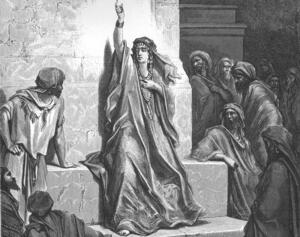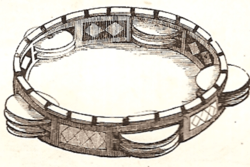My Gateway to Jewish Feminism
When I was younger, I learned about a woman who drove a people from war times to peace. She was widely respected in a male dominated era, and she was one of only seven women who spoke to God directly. The protagonist of the story is the prophetess Deborah. She was one of the only respected, able women, that I learned about in all my years attending Jewish day school, and her story sparked my interest in my own Jewish education.
From kindergarten until eighth grade, I had the luxury of going to a Jewish day school. There I spent a few hours of my school day learning about Jewish tradition, Torah, and culture. Soon after I began cognitively thinking about Jewish culture, I realized that it was rare to come across women in Jewish text, especially ones who broke the gender norms of their time. One of Deborah’s most famous legacies, was how she demonstrated her loyalty to God and her people even in tough circumstances. During a time of war and tension, Deborah took initiative to keep her people safe by assembling an army and invading their enemies. Deborah set an example by becoming the only female judge. Deborah is an anomaly, an exception to the rule. She is respected and celebrated as a wise, warrior-like woman, who served the Jewish people by protecting them against other nations and corrupt practices.
As a young Jewish girl, learning about Deborah was my gateway to feminism. In most of my classes we learned about Abraham, Jacob, Moses, and the rest of patriarchs, along with their wives. Although I obtained a basic knowledge of my Jewish mothers, the rest of the women in Jewish text were usually just noted as “the wives.” Deborah though, is the hero of the story. As the Jewish people resorted to idolatry and other actions against Jewish culture, Deborah took their upsetting new ideas, and turned her disappointment into determination to get her people back on track. Most women in Jewish text are not treated as heroes of the story. Deborah didn’t let her society and her society's popular views stop her from greatness. She demonstrated Michelle Obama’s famous quote: “when they go low, we go high,” and amazingly, our ancient texts kept her story alive as a symbol of female power.
Deborah’s name is another part of what makes her such a strong character. In Hebrew, Deborah means “bee.” The root of the word is mentioned a few times throughout the Torah, and often describes leaders or people who have somewhat of a “bitter sting.” Deborah’s name is a symbol of her power. Sadly, in the Torah, strength and power are usually attributes reserved for male characters, but Deborah’s name asserts that women can also be powerful.
Deborah’s story has stuck with me because she broke so many barriers. Having a woman who is arguably a feminist in ancient Jewish literature is an amazing and admirable thing. Ancient society frowned upon strong women, so for her to achieve all that she did is somewhat of a miracle. The fact that Deborah’s story is still being taught thousands of years after her life, shows how influential her actions were. It is so important for young girls to hear Deborah’s story, so they have her as an example that they too can not only attempt greatness, but achieve it.
This piece was written as part of JWA’s Rising Voices Fellowship.







